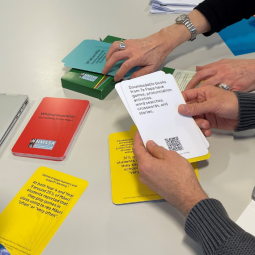The COMPASS project is part of NZCER’s Te Pae Tawhiti Government Grant programme of research. It is also aligned to the broad goals and aspirations of NZCER, in that its overarching purpose is to give effect to Te Tiriti o Waitangi and the notion of Whakatere Tōmua—Wayfinding. The COMPASS project has examined the ways kaiako, ākonga, and whānau navigate educational experiences and contexts.
You are here
Research publications
Research publications from our research teams.
The latest publications are shown by default. Refine your search using the filters below. Press CTRL + click to select more than one option in a group.
Sorted in Schools, Te whai hua – kia ora is a financial capability programme for secondary school students in English-medium (EME) and Māori-medium (MME) education settings. The programme is led by Te Ara Ahunga Ora Retirement Commission (formerly the Commission for Financial Capability). The programme aims to equip all young New Zealanders for their financial future. The first resources were piloted in 2018, and schools and kura started to use the Years 9 and 10 resources in 2019 with senior secondary resources for Years 11–13 launched in June 2020.
A free te reo Māori resource deck for schools
Developed for the National Monitoring Study of Student Achievement (NMSSA), Aronuitia te reo is a deck of cards designed to prompt professional conversations about improving the teaching and learning of te reo Māori. It is intended to assist teachers and/or schools who are early in their reo Māori learning journeys.
Auckland Council’s Sustainable Schools team supported ten Auckland schools to pilot a school carbon footprint calculator between June and November 2021. NZCER carried out research for Auckland Council, to build knowledge about how schools can use a school carbon footprint calculator, and what support, advice, and resources schools need to use it effectively.
Although the pilot period was affected by COVID-19 lockdown, the findings of this pilot suggested that:
NZCER submitted feedback on the Government's Emissions Reduction Plan in November 2021.
Introduction to the study
This small exploratory study was carried out in 2021 by the New Zealand Council for Educational Research (NZCER) for the National Library of New Zealand Te Puna Mātauranga o Aotearoa. The project is part of a wider suite of six studies commissioned by the National Library as part of their Communities of Readers initiative. This initiative foregrounds the benefits of reading for pleasure and the equitable distribution of these benefits across all communities in Aotearoa New Zealand.
This New Zealand Council for Educational Research (NZCER) research project explored the ways five diverse secondary schools shaped their timetables to support innovation in teaching and learning. The timetable is often a taken-for-granted presence in schools, even though it plays an important role in how teaching and learning are experienced. This report identifies key factors that schools may find useful to consider when making changes to their timetable.
Nā Te Wāhanga o te Rangahau Mātauranga o Aotearoa tēnei arotakenga mātātuhi i whakaputa, hei tautoko i ngā kura tuatahi o te ara reo Pākehā e rapu huarahi ana ki te whakapakari i ā rātou hōtaka whakaako, i ā rātou hōtaka ako hoki o te reo Māori.
Ka whakamāramahia ki te pūrongo nei, kia whai aronga rautaki ngā kura tuatahi o te ara reo Pākehā mō te whakaako me te ako i te reo Māori, i te mea:
The national COVID-19 lockdown during school Term 1 and continuing in Term 2 2020, provided a unique context to investigate children’s experiences of informal, everyday learning in their household bubble. In Terms 3 and 4, 178 children in Years 4–8 from 10 primary schools agreed to participate in a group art-making activity and an individual interview about their experiences.
This report documents children’s accounts of the multiple ways in which they negotiated the novel experience of forced confinement over a period of several weeks with family and whānau.






